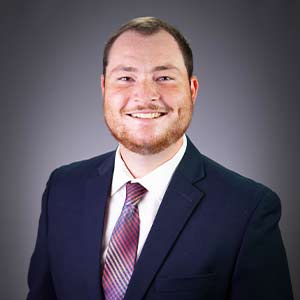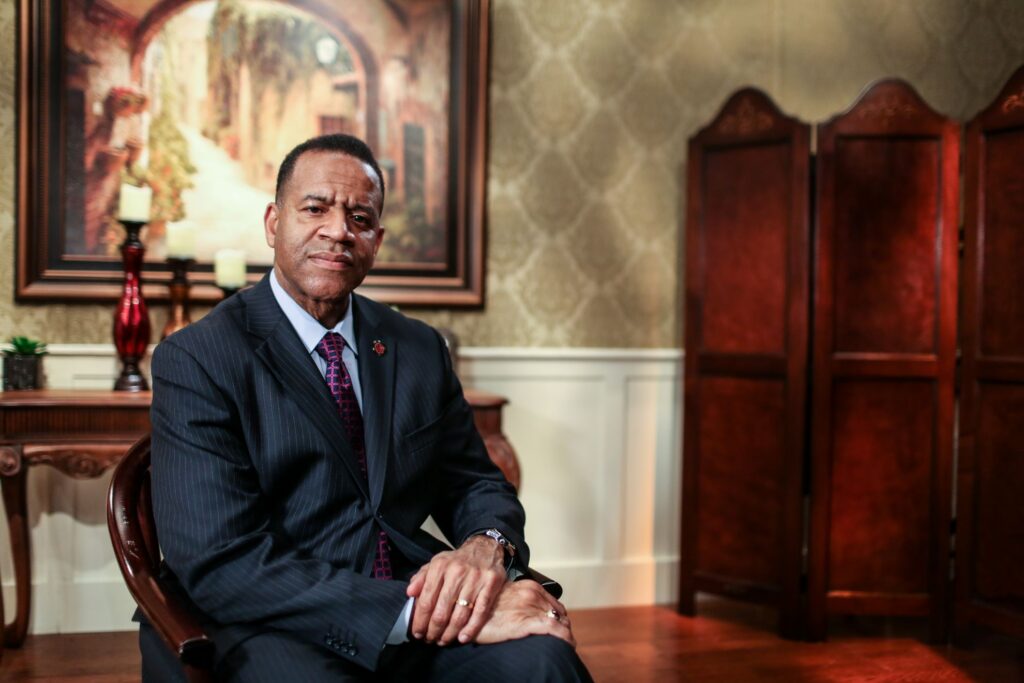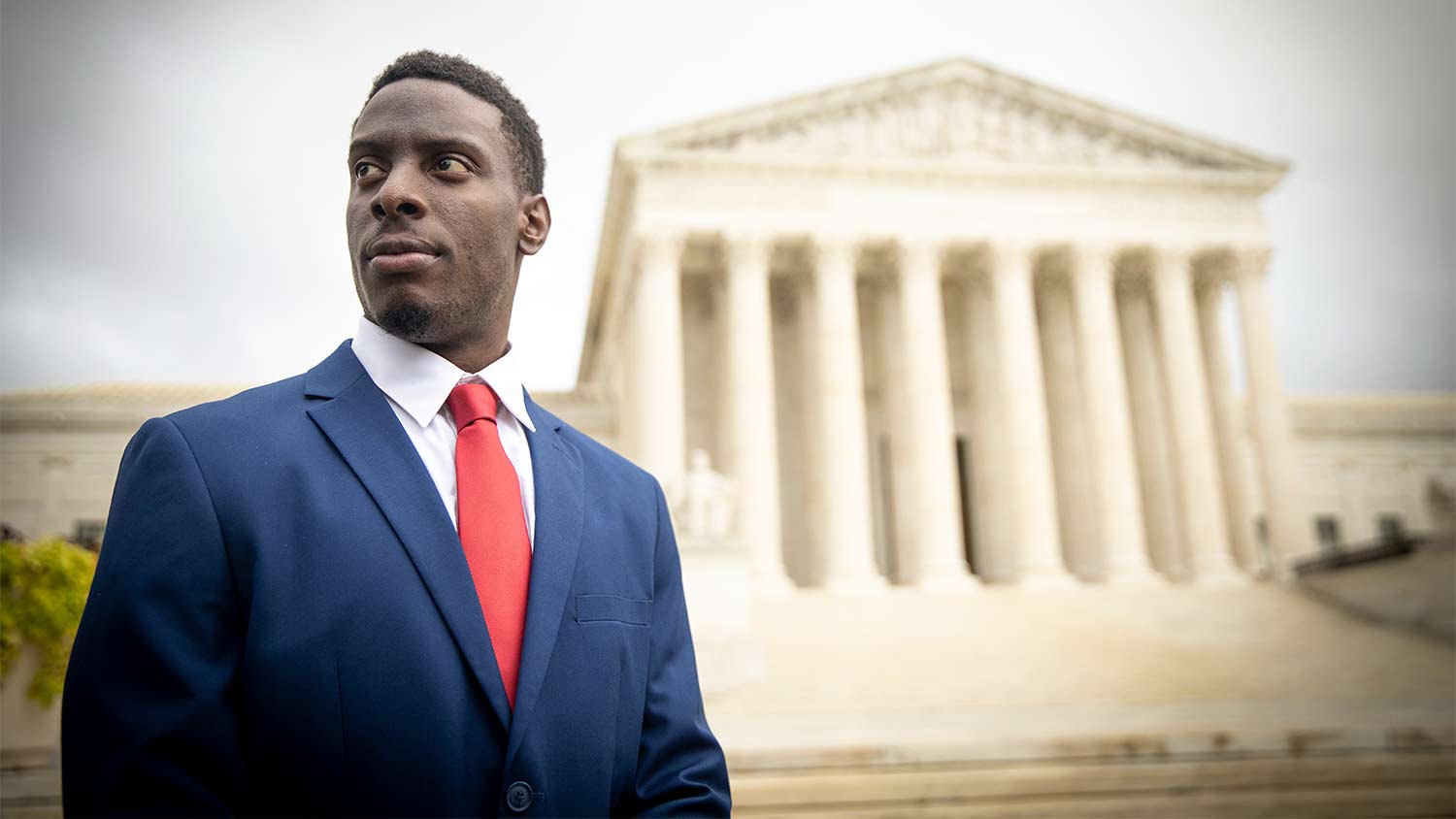
The United States of America was founded on the principle of freedom. Americans are free to express the messages they choose and practice their religion not only in private, but also in the public square.
But some have seemingly forgotten that these freedoms extend to all areas of American life, including public colleges and universities. The First Amendment applies to every American, which is why the freedoms of speech and religion must be protected at all institutions of higher learning.
At Alliance Defending Freedom, our Center for Academic Freedom strives to uphold the First Amendment rights of students and professors. We have won over 435 court victories protecting academic freedom—and counting. ADF remains dedicated to protecting freedom for students and professors across the country.
What is academic freedom?
If you visit any public college or university across the country, you quickly find that not every person at that school shares the same ideas and beliefs about every issue. Students, faculty members, and others on campus inevitably hold a variety of different views.
No matter what side of a particular issue you may fall on, we all should agree that everyone should be able to share their opinions freely and live according to their beliefs. This is the basic logic behind academic freedom.
In some court cases, the term “academic freedom” has been used to refer to a university’s right to choose who teaches its students and the way they teach. But in common parlance, academic freedom is the idea that students, faculty, and all people associated with public colleges and universities have the right to freely express their beliefs and live consistently with their religion, both on and off campus, without punishment from school officials.
What does the ADF Center for Academic Freedom do?
ADF understands that First Amendment freedoms have increasingly come under attack at public colleges and universities around the country. Many administrators have responded to today’s volatile political climate by shutting down or censoring speech, especially the speech of people who hold beliefs that differ from their own.
But shutting down speech only widens the political divide and violates the constitutional rights of those involved with a college or university. At a public university, providing a free and fair education means that the answer is more speech, not less.
The ADF Center for Academic Freedom provides students, student organizations, and faculty members with support and information as they face escalating attacks on their First Amendment rights at America’s public universities.
How have colleges and universities threatened First Amendment rights?
Many colleges and universities use vague or misleading policies to silence people whose beliefs don’t align with those of school administrators. Here are some of the tactics that colleges and universities have used to silence students and professors because of their beliefs.
Maintaining speech zones
Some colleges and universities have established so-called “free speech zones” on their campuses. Despite this misleading name, these areas are not meant to uphold First Amendment freedoms. In many ways, they are designed to do just the opposite—to quarantine free speech to small, often remote areas of campus.
A “free speech zone” is an area established by a college or university in which students are forced to remain if they want to share their beliefs. When a college or university establishes a “free speech zone,” it is often the only place where students and faculty are allowed to exercise their right to speak freely. On the rest of the campus, certain speech is limited or even banned.
The First Amendment applies to all Americans, and it protects freedoms on all public college and university campuses. By limiting free speech to small zones that often make up only a very small portion of campus, colleges and universities are actually fostering an anti-free speech culture.
The ADF Center for Academic Freedom has been extremely successful in challenging campus speech zones that violate the First Amendment. We have a 100 percent success rate against anti-free speech zones. Below are a couple of examples of our victories in speech-zone cases.
Chike Uzuegbunam
When Chike Uzuegbunam was a student at Georgia Gwinnett College, school officials violated his First Amendment rights through the enforcement of speech zones, stopping him from peacefully speaking about his Christian beliefs on multiple occasions.
In July 2016, Chike was handing out pamphlets in a plaza on campus and talking about the Gospel with interested students as they passed. College officials soon approached Chike and told him he could not hand out any materials or speak about his beliefs unless he reserved time in one of the two “free speech zones” on campus.
The space of the two zones made up just 0.00015 percent of campus, and they were only open for student use for 10 percent of the week. To put that in perspective, if the entire campus were the size of a football field, these two speech zones combined would be the size of a sheet of paper. Restricting Chike’s speech to such miniscule spaces and limited times violated his First Amendment rights.
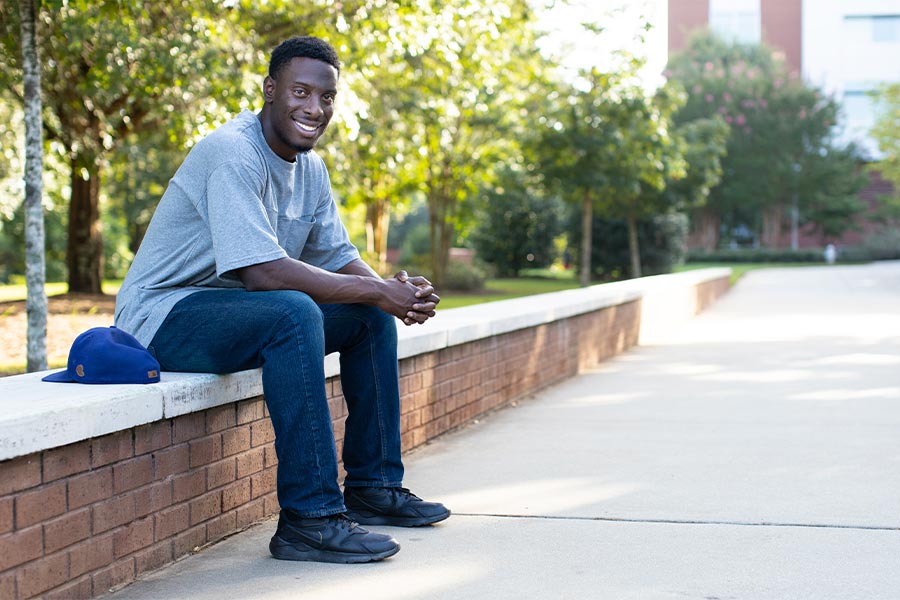
Alliance Defending Freedom filed a lawsuit on Chike’s behalf after the college officials silenced him. Georgia Gwinnett College eventually amended its policy to allow free speech in any outdoor area of campus, but it argued that college officials should receive a free pass for silencing Chike since it amended its policy.
The case went all the way to the U.S. Supreme Court, which ruled 8-1 that the college officials can be held accountable when they violate students’ rights. Following the Court’s decision, Georgia Gwinnett College officials agreed to a settlement and paid nominal damages and attorneys’ fees totaling over $800,000.
Bernadette Tasy
Another case involving unconstitutional speech zones occurred at Fresno State University in April 2017. The story began when Bernadette Tasy, the president of the Fresno State Students for Life club, got permission from the university for the group to write positive, life-affirming messages on the sidewalks leading to the library.
As the members finished writing their messages, a professor confronted them and falsely claimed they could not write these positive messages on the sidewalk. He said they could only express their beliefs in the so-called “free speech” area, but the university had eliminated that area almost two years prior to the incident.
Even though Bernadette told the professor she had received permission from the university to write the messages, he said he would come back and erase them. He soon returned with several students from one of his classes to erase and deface the messages. He even erased one of the messages himself and told Bernadette that “college campuses are not free speech areas.”
ADF filed a lawsuit against the professor for this blatant First Amendment violation, and he agreed to a settlement in which he paid almost $28,000 in attorneys’ fees and damages and was required to attend a training session on free speech led by an ADF attorney.
Implementing speech codes
Colleges and universities have also violated the First Amendment rights of students and faculty members using speech codes. Whereas speech zones limit where students can speak, speech codes try to restrict what students can say.
Chike Uzuegbunam
In addition to enforcing its speech zones, Georgia Gwinnett College used its speech code to silence Chike Uzuegbunam. After college officials told Chike he could only hand out pamphlets in the designated zones, he attempted to follow their rules even though they were censoring him. He reserved a time in a “free speech zone,” and he received approval for the pamphlets he wanted to hand out.
But shortly after Chike began to distribute his pamphlets, college police officers approached him and told him he had to stop expressing his message because someone had complained. They said they were enforcing the college’s Student Code of Conduct, which prohibited students from saying anything that disturbed the “peace and/or comfort” of others. This meant Chike couldn’t speak his message anywhere on campus, including inside the “free speech zone.”
Thankfully, this unconstitutional speech code was one of the policies that Georgia Gwinnett College amended in response to ADF’s lawsuit.
A relatively new way in which colleges and universities have begun illegally censoring students is by aggressively enforcing speech codes through “no-contact orders.” These orders usually bar students from speaking to one or more of their classmates, and they are often issued without warning or explanation.
Maggie DeJong
That was the case when Southern Illinois University Edwardsville issued three no-contact orders against graduate art therapy student Maggie DeJong. Maggie was shocked when she received the orders, which barred her from interacting with three classmates within her small program.
As it turned out, some graduate students in her program had raised concerns about Maggie sharing her religious and political beliefs on social media and in private conversations with other students. They reported her to the university, and officials issued the no-contact orders against Maggie in February 2022—even though she hadn’t violated any rule or policy.

ADF attorneys sent a letter to the school demanding that it retract the no-contact orders, which it finally did a few days later. Even so, it had already dragged Maggie’s name through the mud and violated her constitutional rights. ADF ultimately filed a lawsuit on Maggie’s behalf in May 2022.
Peter Perlot, Mark Miller, Ryan Alexander, and Richard Seamon
A similar injustice took place at the University of Idaho College of Law. After an anti-LGBT slur was written on a whiteboard at the school’s Boise campus, the Moscow campus held a “moment of community.” Peter Perlot, Mark Miller, and Professor Richard Seamon, who were members of the school’s chapter of the Christian Legal Society (CLS), attended the event and prayed on the steps.
After the prayer, a student who was not a CLS member asked why they believed marriage was between one man and one woman. Mark politely explained that this is the definition of marriage laid out in the Bible, and Professor Seamon agreed.
Peter, who was the president of the CLS chapter at the time, later left a note on the student’s desk offering to talk further with her so that they could better understand each other. But in the days that followed, other students and professors began to mischaracterize the CLS members’ beliefs. Ryan Alexander, another member of the chapter, spoke up at an event to defend Peter, Mark, and Professor Seamon.
Instead of respecting First Amendment freedoms, the University of Idaho Law School issued no-contact orders against Peter, Mark, and Ryan that barred them from interacting with the student who had asked about their beliefs. The law school also issued a similar order banning Professor Seamon from interacting with the student outside of what was required for class.
ADF filed a lawsuit against the school for punishing the four men simply because they responded to questions about their faith. After a federal district court agreed to temporarily block the no-contact orders, University of Idaho officials agreed to a settlement in which they permanently rescinded all four orders and paid $90,000 stemming from the lawsuit.
Restricting the ability of religious groups to organize
Some colleges and universities have tried to silence certain messages by restricting or preventing religious groups from organizing. The University of Colorado–Colorado Springs was one university that tried to employ this tactic.
Ratio Christi at the University of Colorado–Colorado Springs
Ratio Christi, a Christian apologetics organization, sought to become a registered student group at UCCS. But the university initially barred the group from gaining registered status for several years.
While Ratio Christi allows students of any faith to become members, it requires its leaders to share its Christian beliefs so that they can effectively help the group pursue its purpose. UCCS said it would not grant Ratio Christi registered status unless it allowed non-Christians to lead the group. The university’s decision limited Ratio Christi’s access to funding, meeting and event space, and administrative support.
ADF filed a lawsuit on behalf of Ratio Christi, and UCCS agreed to a settlement in which it paid over $20,000 in damages and attorneys’ fees and updated its policies to ensure that student groups can require their leaders to hold beliefs consistent with their missions.
Ratio Christi at the University of Houston–Clear Lake
In a separate but very similar incident, the University of Houston–Clear Lake refused to grant Ratio Christi registered status on its campus because of the group’s leadership requirements. ADF also represented Ratio Christi in this case, and the university agreed to modify its handbook as part of a settlement agreement.
The University of Houston–Clear Lake added language to its handbook clarifying that “a student organization may limit Officers to those members who subscribe to the tenets of that organization.” It also paid over $26,000 in damages and attorneys’ fees to Ratio Christi in the settlement.
Curtailing the availability of student fees
Another way colleges and universities have violated the First Amendment is through mandatory student fees. While they often attempt to force all students to pay fees, many colleges and universities pick and choose which groups can benefit from them. This, in turn, undermines academic freedom in that it excludes or minimizes certain voices in the campus conversation.
Board of Regents of the University of Wisconsin System v. Southworth
One of the most important Supreme Court rulings regarding mandatory student fees was Board of Regents of the University of Wisconsin System v. Southworth. In that case, the University of Wisconsin required all students to pay mandatory fees that were used to fund student groups. University policy allowed the student government to use its own unbridled discretion to decide which groups would receive funding, and they allocated the funds to groups that advocated views many students disagreed with—groups dedicated to pro-abortion advocacy, for example. Students were not allowed to opt out of paying the fees.
Scott Southworth, a law student at the University of Wisconsin, contacted ADF about the mandatory fees. We connected him with Jordan Lorence, an ADF Allied Attorney at the time who is now an ADF attorney.
ADF funded the case from the outset, and it eventually made its way to the Supreme Court. In a 9-0 ruling, the Court said public colleges and universities cannot compel students to pay these fees unless they allocate the funds in a viewpoint-neutral fashion. The Court ruled that colleges and universities could not discriminate against certain groups through vague criteria aimed at hiding viewpoint discrimination. In short, if universities collect these fees from all students, they have to let all student groups – regardless of their views – have an equal shot at receiving funding.
This was one of the first Supreme Court Cases that ADF funded from beginning to end, and it laid the groundwork for further victories in court.
Badger Catholic
Years later, the University of Wisconsin violated the First Amendment again by denying funding to a Roman Catholic student organization called Badger Catholic. The university said Badger Catholic was excluded from funding for any activities involving “worship,” “prayer, or “proselytizing,” even though the funding came from mandatory student fees. This was a blatant viewpoint-based exclusion, which the Supreme Court’s Southworth decision prohibited.
ADF once again filed a lawsuit against the University of Wisconsin, and the U.S. Court of Appeals for the 7th Circuit relied heavily on Southworth in its decision.
The court ruled that the university policy barring Badger Catholic from funding for its activities the university deemed “worship, prayer, or proselytizing” violated the First Amendment, and Badger Catholic soon began to receive funding from the student government for those activities.
Nathan Apodaca
Another ADF case regarding mandatory student fees was Apodaca v. White. In this case out of California State University–San Marcos, the pro-life organization Students for Life asked the student government for $500 to host a guest speaker to discuss “Abortion and Human Equality.”
The student government used vague policies to deny the request, but at the same time, it was funneling almost $300,000 to the Gender Equity Center (which advocates abortion) and the LGBTQA Pride Center. ADF filed a lawsuit on behalf of Nathan Apodaca, the president of the campus chapter of Students for Life.
In 2019, a district court struck down the university’s policy of “back-room deliberations” that led to unequal funding for student groups. California State University–San Marcos then agreed to revise its policies to prevent content-based discrimination and pay over $240,000 stemming from the lawsuit.
Compelling students and faculty to express certain messages
Students and professors have a right to speak freely on campus, and universities cannot punish them for their beliefs or compel them to say things that they do not believe. But this happens far too often.
Dr. Nicholas Meriwether
Dr. Meriwether is a philosophy professor at Shawnee State University. For over 20 years, he taught at the university without any blemish on his record. But one day, a male student approached Dr. Meriwether and demanded that the professor refer to him as a woman. Dr. Meriwether did not immediately agree, and the student began to circle him, get in his face, and scream expletives at him.
The student went on to file a complaint with university officials, who launched an official investigation. Dr. Meriwether informed them that because of his beliefs that God created everyone male or female and that sex cannot be changed, he could not refer to a male student as a female. Instead, he offered to only refer to the student by a first or a last name and avoid the use of pronouns.
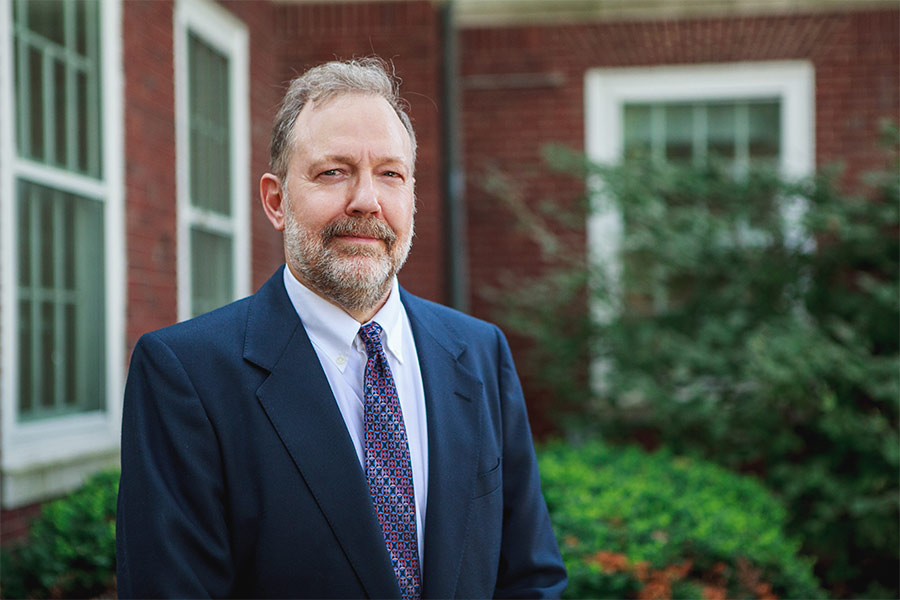
Officials at Shawnee State did not agree to Dr. Meriwether’s suggested accommodation. They issued a written warning against Dr. Meriwether, claiming he had discriminated against the student and “created a hostile environment” simply because he declined to express a message that would have violated his beliefs. The university also threatened to take “further corrective actions” if Dr. Meriwether did not start using the student’s preferred pronouns.
In 2018, ADF attorneys filed a lawsuit on behalf of Dr. Meriwether. The U.S. Court of Appeals for the 6th Circuit ultimately ruled in his favor, and the university agreed to a settlement in which it rescinded the written warning, affirmed Dr. Meriwether’s right to speak freely, and agreed to pay $400,000 in damages and attorneys’ fees.
Emily Brooker
Emily Brooker experienced a similar violation of her First Amendment rights during her time as a student at the Missouri State University School of Social Work. One of Emily’s professors gave her an assignment to sign a letter to the Missouri legislature advocating for same-sex adoption, which would go directly against her deeply held beliefs.
Emily asked her professor for a different assignment that would not violate her beliefs, and he initially agreed. But a few days later, the professor reversed course and charged Emily with a level three grievance—the highest form of punishment in the School of Social Work.

Staying true to her beliefs, Emily still declined to sign the letter. She was brought before a panel of Missouri State faculty members who interrogated her about her faith. Emily was forced to sign a contract saying she would not let her religious beliefs interfere with her schoolwork or she would be expelled.
Emily contacted an ADF allied attorney for help, and ADF filed a lawsuit against the university on her behalf. Missouri State quickly agreed to settle the case in Emily’s favor and put the professor who had given Emily the assignment on leave.
Punishing faculty members for speaking certain messages
Some colleges and universities have punished professors simply for speaking freely. Dr. Kenneth Howell experienced this injustice firsthand at the University of Illinois, Urbana-Champaign.
Dr. Kenneth Howell
Dr. Howell was an adjunct associate professor for the study of religion at the university, and he taught a course titled “Introduction to Roman Catholicism.” While teaching this course, Dr. Howell spoke to his students about the Catholic teaching on homosexual behavior. The university fired Dr. Howell after he spoke on this subject—without even giving the professor a chance to explain himself.
After ADF sent the university a letter explaining that it had violated the First Amendment, the university offered Dr. Howell his job back. It later determined that it had inappropriately denied Dr. Howell his rights when it terminated his contract.
Dr. Nathaniel Hiers
At the University of North Texas, mathematics professor Dr. Nathaniel Hiers was unjustly terminated for expressing his own beliefs.
In November 2019, Dr. Hiers noticed some flyers in a faculty lounge warning people about the alleged harms of “microaggressions.” The flyers went so far as to say that statements like “America is a melting pot” and “I believe the most qualified person should get the job” qualified as “microaggressions” because they promoted “color blindness” and “the myth of meritocracy.”
Dr. Hiers believes that the concept of “microaggressions” encourages people to assume the worst in others and shuts down meaningful dialogue on contentious issues. So when he returned to the lounge later and saw that the flyers were still there, he jokingly wrote, “Please don’t leave garbage lying around” on the chalkboard with an arrow pointing to the flyers.
Even though professors often engaged in lighthearted banter like this in the lounge, the chair of the math department took offense at Dr. Hiers’ message. After Dr. Hiers admitted that he was the one who wrote it, the chair told him the message was “stupid” and pressured him to apologize.
Dr. Hiers did not apologize, because he didn’t believe he had done anything wrong. But soon after, he received an email informing him that his contract had been terminated and that he would not be teaching at the school during the next semester.
ADF filed a lawsuit on behalf of Dr. Hiers, and a federal district court ruled that University of North Texas officials likely violated Dr. Hiers’ rights and would be personally liable for damages if they did. The university ultimately agreed to pay $165,000 in damages and attorneys’ fees as part of a settlement.
Conclusion
Every American is entitled to the freedoms laid out in the Constitution, and those freedoms extend to the campuses of colleges and universities anywhere in the country. When government officials infringe on the First Amendment rights of students and professors, they are violating the Constitution, and they must be held accountable.
One of the most important factors in protecting academic freedom and First Amendment rights is the willingness to take a stand. When people stand up for their rights instead of letting colleges and universities trample on them, good things happen.
ADF’s Center for Academic Freedom has a 91 percent success rate in direct litigation, and that does not even encapsulate all our work. Sometimes, like in the case of Dr. Howell, all it takes is a demand letter to achieve meaningful change protecting Americans’ rights.
The First Amendment protects the rights of each and every one of us here in the United States, and the ADF Center for Academic Freedom is committed to ensuring that protection at public colleges and universities nationwide. Whenever a university tramples on these God-given rights, it’s time to take a stand.


